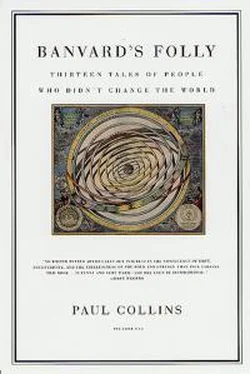He came forward with a hideous grin, and made what he considered a bow--which consisted of thrusting his head forward, and bobbing it up and down several times, his body remaining perfectly upright and stiff, like a toy mandarin with a moveable head.
His dress was outrè in the extreme: whether Spanish, Italian, or English, no one could say; it was like nothing ever worn. In a cloak of sky-blue silk, profusely spangled, red pantaloons, a vest of white muslin, surmounted by an enormously thick cravat, and a wig @a la Charles the Second, capped by an opera hat, he presented one of the most grotesque spectacles ever witnessed upon the stage.
For full effect, his hat was topped with ostrich feathers and a liberal sprinkling of diamonds; still more diamonds were sewn into his pantaloons and his shoe buckles, and gold spangles had then been slathered onto the leather of these shoes. The whole glittering costume was so tight upon his body that his limbs bulbed out like sausages, and he jerked across the stage in a tight-wrapped transport of delight. Every word he pronounced was wrong-histrionically rising and falling, with the wrong emphasis, and apt to simply dispense with the Bard's script altogether. Coates would occasionally turn to the audience with a ghastly grin, glorying in the moment. And then his pants burst.
It was something that only a few in the front row might have noticed at first, but Romeo's pants were so tight that the seat blew out. Audience members watched in disbelief at "the sudden extrusion through the red rent of a quantity of white linen sufficient to make a Bourbon flag, which was visible whenever he turned around." Ladies in the crowd were scandalized, and then, when it became clear that Coates had no idea what had befallen him, it became increasingly difficult to suppress the giggling.
And so the crowd watched in a sort of horrified fascination for all the first act, until finally some miscreants began to yell at him.
"Off! Off!"
Apple cores and orange peels, the favored weapons of theater ruffians, rained down from the balconies and onto the stage. A hissing filled the room.
Coates paused from his scene, still blissfully unaware of his bunnytail of undergarments, and glared witheringly at his critics. Then, undaunted, he finished, and allowed the curtain to fall. He continued on, lurching through until he reached the climax of the play.
Juliet appeared dead, and so he, the grieving Romeo, was to pick her up and carry her in grief away from her tomb. Coates picked up the unfortunate actress like a sack of laundry and tossed her aside. Then, whipping out a handkerchief from his pocket, he carefully dusted the floor of the stage, and gently took off his massive sparkling hat and set it on a convenient pillow.
Only now was he, Romeo, ready to die; but for reasons known only to Coates, he decided to address his entire dying soliloquy in a whisper to a single box by the stage.
Here's to my love! [He drinks the
poison.] Oh true apothecary, Thy drugs are quick! Thus with a kiss I die.
His speech may have been inaudible to the puzzled patrons of the theater, but Coates was not a man to let his hero die without a fight. He took minutes to die--gasping and grimacing over and over again as he lay writhing on the floor, groaning his way through every stage agony imaginable. The crowd began to shriek with laughter now, and one wag's voice rose above the din:
"Die again, Romeo!"
Coates, lying sprawled out on the stage, decided this was a splendid idea. And so he miraculously resurrected himself to a full standing position, took another swig of the prop vial of poison, and then proceeded to die all over again.
No sooner had Romeo completed his final death-shiver than another cry went up.
"Die again, Romeo!"
Delighted, Coates stood up again, and would have gone through it a third time, had not his costar, Juliet, so appalled that she rose up from her grave as well, stepped in to put a stop to it. The tumult in the audience became deafening. Arguments were arising on all sides, and the panicked manager let loose the stage weight so that the curtain came crashing down on the scene, never to rise again.
Patrons sat stunned, unable to decide whether what they had witnessed was comically tragic or perhaps just tragically comic. It was certainly unique.
The Bath Theatre exploded in applause.
Odd reports of Coates's appearances surfaced over the next couple years: a show in Brighton, and dazzling recitations to assemblages of noble friends at dinner parties. When Coates finally arrived in London and took up lodgings in the Strand, it could only be a matter of time before Drury Lane fell before his diamond cane.
Coates soon became as famous on the streets of London as he had been in Bath, jaunting about Pall Mall and Bond Street in his blue scallop-shell chariot, glittering from head to toe with diamonds. His passage was marked by the shouts of onlookers as he a passed by: "Cock-a-doodle-doo!"
Coates, as proud as ever with the cock logo on the side of his carriage, was very pleased by all this. Local papers gossiped and jested over the man they called "Romeo Coates" and "Diamond Coates," and he developed a crowd of hangers-on, many of whom would have been glad to have but a single diamond button pop off his shirt and into their pockets. Coates lent them money freely, rarely expecting to see it back. The more desperate their straits and the less likely that a loan would ever see any gain to Coates's social standing, the more generous he was. In the back-stabbing world of London social climbers, Coates was guileless.
When a poor widow came to him to ask for help, there was but one action he could take: a benefit play. But first he had to warm up, and that meant playing off-Soho: in Richmond, to be precise. He held a one-night stand at the Theatre Royal on the night of September 4, 1811, reprising his role of Romeo.
His reputation much preceded him; ladies in the audience came prepared to defend their glamorous hero, and drunken young bucks arrived with pockets stuffed with fruit ripe for throwing.
Coates was ready for them. There was the usual fracas during Romeo's death scene, with supercilious young men sniggering ironically at Romeo's prolonged death throes. But Coates concluded his show by strolling to the center of the stage and reciting a poem to his audience:
BUCKS, HAVE AT YE ALL
Ye social friends of claret and of wit, Where'er dispersed in social groups ye sit. Damn me, I know you, and have at ye all ...
If you with plaudits echo to renown, Or urged with fury tear the benches down,
'Tis still the same, to one God ye prate, To show your judgment and approve your taste.
'Tis not in nature for ye to be quiet. No, damn me, Bucks exist in but a riot.
For instance now--To please the ear and charm the adoring crowd, Your Bucks of the boxes sneer and talk aloud, To the green-room next with joyous speed you run.
Hilly ho! ho! my Bucks! Well,
damn it, what's the fun? Though Shakespeare speaks, regardless of the play Ye laugh and loll the sprightly hours away For to seem sensible of real merit, Oh! damn me, it's low, it's vulgar, beneath us
lads of spirit!
You Bucks of the pit are mirades of learning, Who point out faults to show their own discerning; And critic like, bestriding martyred sense, Proclaim their genius and vast consequence.
The actor wheeled and pointed straight into a theater box of his greatest tormentors:
Ye Bucks of the boxes there, who roar and
reel, Too drunk to listen and too proud to feel!
The theater leaped into an ovation. With this one speech Romeo Coates, the most outlandishly bad actor in existence, had shamed his detractors. For he
had something that scarcely anyone else in the theater has had before or since: complete sincerity.
Читать дальше











